

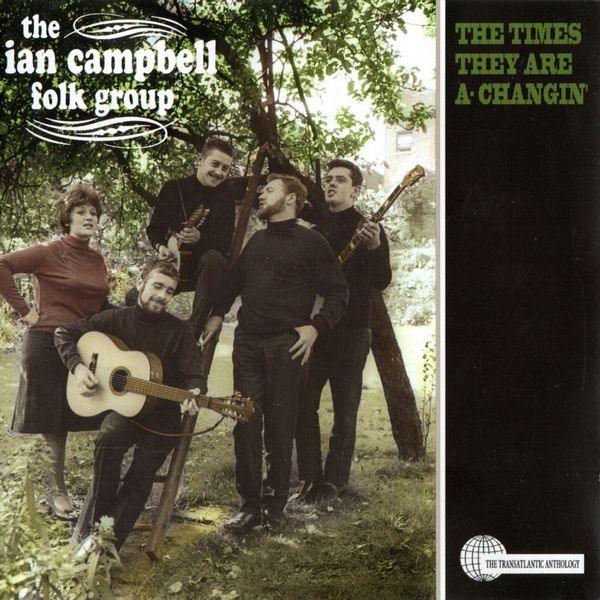 |
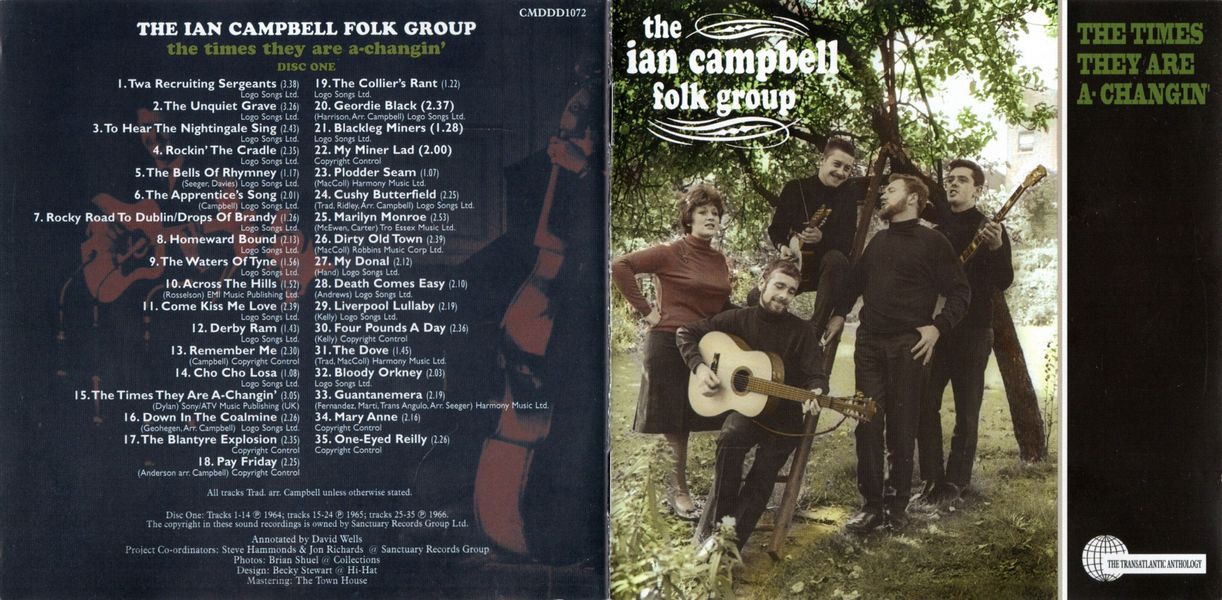
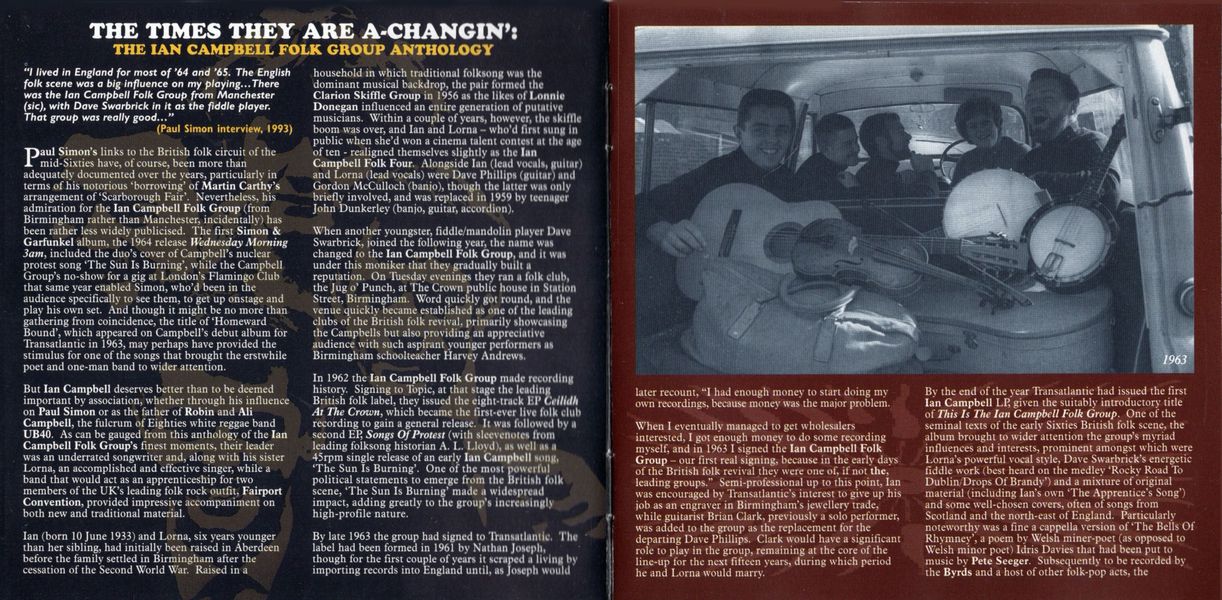
|
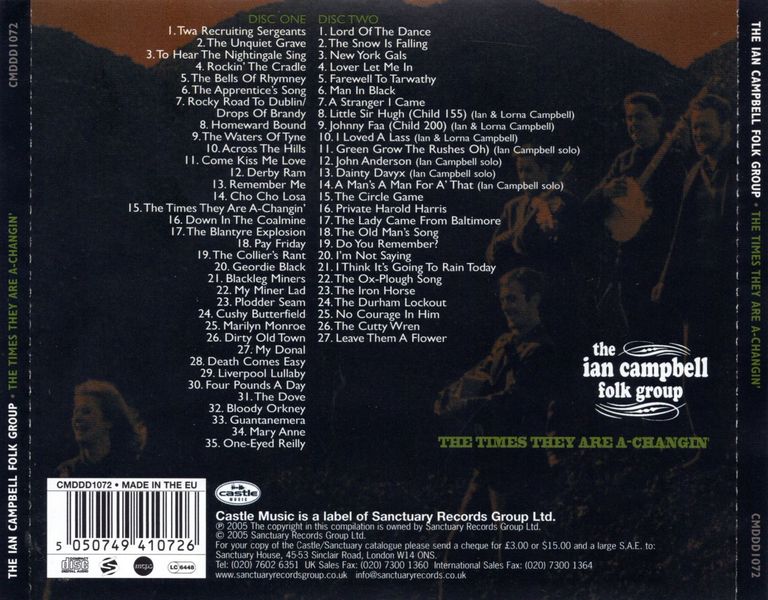
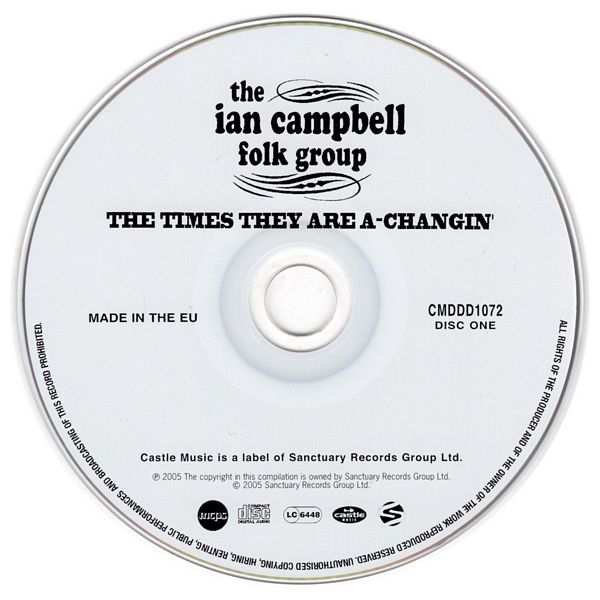
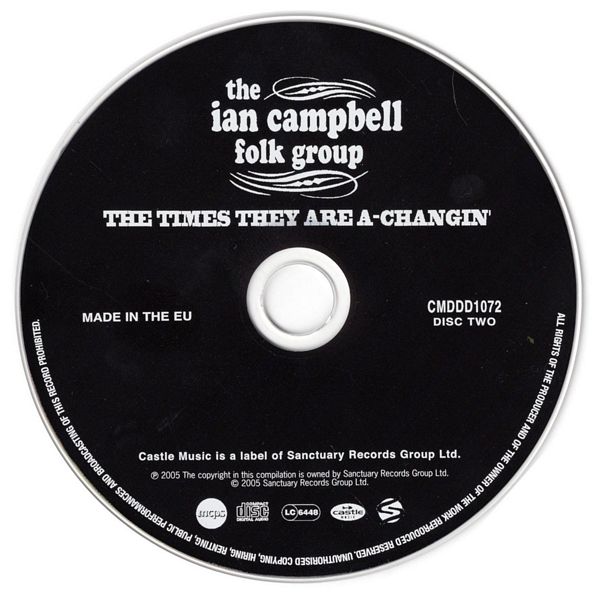
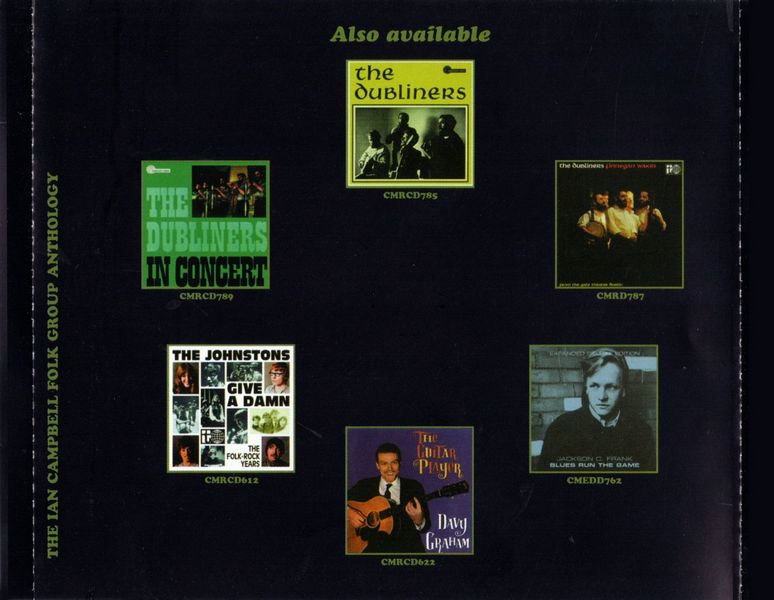
|
| more images |
Sleeve Notes
"I lived in England for most of '64 and '65. The English folk scene was a big influence on my playing … There was the Ian Campbell Folk Group from Manchester (sic), with Dave Swarbrick in it as the fiddle player. That group was really good … "
(Paul Simon interview, 1993)
Paul Simon's links to the British folk circuit of the mid-Sixties have, of course, been more than adequately documented over the years, particularly in terms of his notorious 'borrowing' of Martin Carthy's arrangement of 'Scarborough Fair'. Nevertheless, his admiration for the Ian Campbell Folk Group (from Birmingham rather than Manchester, incidentally) has been rather less widely publicised. The first Simon & Garfunkel album, the 1964 release Wednesday Morning 3am, included the duo's cover of Campbell's nuclear protest song 'The Sun Is Burning', while the Campbell Group's no-show for a gig at London's Flamingo Club that same year enabled Simon, who'd been in the audience specifically to see them, to get up onstage and play his own set. And though it might be no more than gathering from coincidence, the title of 'Homeward Bound', which appeared on Campbell's debut album for Transatlantic in 1963, may perhaps have provided the stimulus for one of the songs that brought the erstwhile poet and one-man band to wider attention.
But Ian Campbell deserves better than to be deemed important by association, whether through his influence on Paul Simon or as the father of Robin and Ali Campbell, the fulcrum of Eighties white reggae band UB40. As can be gauged from this anthology of the Ian Campbell Folk Group's finest moments, their leader was an underrated songwriter and, along with his sister Lorna, an accomplished and effective singer, while a band that would act as an apprenticeship for two members of the UK's leading folk rock outfit, Fairport Convention, provided impressive accompaniment on both new and traditional material.
Ian (born 10 June 1933) and Lorna, six years younger than her sibling, had initially been raised in Aberdeen before the family settled in Birmingham after the cessation of the Second World War. Raised in a household in which traditional folksong was the dominant musical backdrop, the pair formed the Clarion Skiffle Group in 1956 as the likes of Lonnie Donegan influenced an entire generation of putative musicians. Within a couple of years, however, the skiffle boom was over, and Ian and Lorna — who'd first sung in public when she'd won a cinema talent contest at the age of ten — realigned themselves slightly as the Ian Campbell Folk Four. Alongside Ian (lead vocals, guitar) and Lorna (lead vocals) were Dave Phillips (guitar) and Gordon McCulloch (banjo), though the latter was only briefly involved, and was replaced in 1959 by teenager John Dunkerley (banjo, guitar, accordion).
When another youngster, fiddle/mandolin player Dave Swarbrick, joined the following year, the name was changed to the Ian Campbell Folk Group, und it was under this moniker that they gradually built a reputation. On Tuesday evenings they ran a folk club, the Jug o' Punch, at The Crown public house in Station Street, Birmingham. Word quickly got round, und the venue quickly became established as one of the leading clubs of the British folk revival, primarily showcasing the Campbells but also providing an appreciative audience with such aspirant younger performers as Birmingham schoolteacher Harvey Andrews.
In 1962 the Ian Campbell Folk Group made recording history. Signing to Topic, at that stage the leading British folk label, they issued the eight-track EP Ceilidh At The Crown, which became the first-ever live folk club recording to gain a general release. It was followed by a second EP, Songs Of Protest (with sleeve notes from leading folksong historian A. L. Lloyd), us well as a 45rpm single release of an early Ian Campbell song, 'The Sun Is Burning'. One of the most powerful political statements to emerge from the British folk scene, 'The Sun Is Burning' made a widespread impact, adding greatly to the group's increasingly high-profile nature.
By late 1963 the group had signed to Transatlantic. The label had been formed in 1961 by Nathan Joseph, though for the first couple of years it scraped a living by importing records into England until, as Joseph would later recount, "I had enough money to start doing my own recordings, because money was the major problem.
When I eventually managed to get wholesalers interested, I got enough money to do some recording myself, and in 1963 I signed the Ian Campbell Folk Group — our first real signing, because in the early days of the British folk revival they were one of, if not the, leading groups." Semi-professional up to this point, Ian was encouraged by Transatlantic's interest to give up his job as an engraver in Birmingham's jewellery trade, while guitarist Brian Clark, previously a solo performer, was added to the group as the replacement for the departing Dave Phillips. Clark would have a significant role to play in the group, remaining at the core of the line-up for the next fifteen years, during which period he and Lorna would marry.
By the end of the year Transatlantic had issued the first Ian Campbell LP, given the suitably introductory title of This Is The Ian Campbell Folk Group. One of the seminal texts of the early Sixties British folk scene, the album brought to wider attention the group's myriad influences and interests, prominent amongst which were Lorna's powerful vocal style, Dave Swarbrick's energetic fiddle work (best heard on the medley 'Rocky Road To Dublin/Drops Of Brandy') and a mixture of original material (including Ian's own 'The Apprentice's Song') and some well-chosen covers, often of songs from Scotland and the north-east of England. Particularly noteworthy was a fine a cappella version of 'The Bells Of Rhymney', a poem by Welsh miner-poet (as opposed to Welsh minor poet) Idris Davies that had been put to music by Pete Seeger. Subsequently to be recorded by the Byrds and a host of other folk-pop acts, the Campbells had first heard the song back in 1961 when Seeger had played in Birmingham.
Though This Is The Ian Campbell Folk Group didn't trouble the chart compilers, it was rapturously received by the British folk movement, and many of the songs on the album found their way into the repertoires of other club acts. It also received great acclaim in America, where highly respected New York Times critic Robert Shelton suggested that, on recorded evidence, the Ian Campbell Folk Group "may be the most exciting new folk group in years". Such acclaim doubtlessly contributed to the album being released in the US by Elektra, who omitted both 'The Jute Mill Song' and 'Homeward Bound' from the revised running order, while the group were also invited to perform at the Newport Folk Festival around this juncture.
This Is The Ian Campbell Folk Group proved to be the start of a long and fruitful relationship between the group and Transatlantic that served to raise the profile of both parties. From Transatlantic's perspective, the prestige attached to having the Campbells on board, quickly followed by the Dubliners and Bert Jansch, saw them acknowledged as the leading British folk label of the era. Equally, Transatlantic's marketing helped the Campbells establish their name, and they appeared at such elevated venues as the Royal Albert Hall and the Royal Festival Hall as well as performing regularly on both UK and US television.
A second album, Across The Hills, was in much the same vein as the group's debut album, though the stylistic net was certainly widened on 'Cho Cho Losa', a 'mouth music' chant practiced by Negro mine workers in Johannesburg — the Campbells had picked this up from visiting South African group the Manhattan Brothers at the 1963 Edinburgh Folk Festival. Other tracks from Across The Hills were slightly less exotic, though the Leon Rosselson-penned title song and a strong version of the playful 'The Derby Ram', sung by Brian Clark, were undoubted highlights, as was 'Remember Me', which matched the tune of 'John Riley' to Ian's lyric, beautifully handled by Lorna.
It was to be the next release, however, that brought the Ian Campbell Folk Group to their widest audience yet. Albums like The Freewheelin' Bob Dylan and Another Side Of Bob Dylan had introduced a callow youth with a voice like sand and glue to folkies on both sides of the Atlantic, but as yet he had failed to move beyond the folk fanatics to embrace across-the-board pop stardom. Thus it was that the Campbells recorded a version of his call-to-arms, 'The Times They Are A-Changin", that the canny Nat Joseph released as a stand-alone single at the beginning of March 1965. Alleged to be the first non-US cover of Dylan material, it was certainly the first of his songs to reach the British singles chart, spending five weeks in the listings despite climbing no higher than the No 42 position. Sadly its progress was halted when CBS, noting Transatlantic's success with a year-old song, retaliated by issuing the original version in 45rpm format. It duly reached the British Top Ten, to become the first in a run of nine consecutive UK hit singles for Dylan over the next fifteen months. Perhaps without that initial, Campbell-inspired prod, CBS would never have viewed him as a singles act …
Perhaps. But the Campbells shied away from potential pop stardom with their next studio venture. One of their strongest albums of the era, Coaldust Ballads did exactly what it said on the tin, assembling a bunch of songs that sprang from various aspects of the coal mining industry. The savage 'Blackleg Miners', which told of the militant miner's attitude to the non-union man, was already widely known, but much of the more obscure material came from A. L. Lloyd's collection of mining songs, Come All Ye Bold Miners. 'The Plodder Seam' had been written by Ewan MacColl just prior to the Second World War, while 'Cushy Butterfield' featured a lyric from mid-19th Century Collier comedian George Ridley set to the tune of the old music hall favourite 'Pretty Polly Perkins'.
Whereas Coaldust Ballads was rooted in the past, Contemporary Campbells brought the group's approach up to date with a batch of material from more recent writers. Sydney Carter's 'Marilyn Monroe' is probably still the finest song ever written about the Hollywood legend (and yes, I have heard 'Candle In The Wind'), while both The Dove' and the celebrated 'Dirty Old Town' — apparently written about Salford, but a fairly universal concept — emanated from Ewan MacColl, with the latter song boasting a superb lead vocal from Brian Clark that encapsulated the despair and disgust at the heart of the lyric. The dramatic 'Death Come Easy' was penned by the Campbells' Jug o' Punch protegé (and, by now, fellow Transatlantic signing) Harvey Andrews, 'My Donal' came from another label-mate, Edinburgh's Owen Hand, and Stan Kelly was responsible for the controversial 'Four Pounds A Day' — written as an antidote to the tendency for songwriters to romanticise the working man, but which attracted criticism in some quarters as an affront to the dignity of labour — and 'Liverpool Lullaby', a sanitised version of which was subsequently popularised by the blessed Cilia Black. Perhaps the most arresting track on Contemporary Campbells, however, was 'Bloody Orkney', a hilariously disaffected little ditty that had been put together by a bunch of Londoners less than thrilled at having been posted to the wilds of Orkneys during the Second World War!
Unfortunately Contemporary Campbells would be the last album to feature Dave Swarbrick, who left to play with Martin Carthy as well as recording an early solo set, Rags Reels & Airs: by the end of the decade, of course, he'd be a fully paid-up member of Fairport Convention. In his place came bassist Mansell Davies, who'd helped out on Contemporary Campbells, and flautist George Watts.
While the Ian Campbell Folk Group were always primarily associated with the long-playing format, their relative success with 'The Times They Are A-Changin" meant that Transatlantic boss Joseph was always on the lookout for a left-field pop/folk crossover hit. As a result, the group recorded a fair number of stand-alone singles, including a brace of interesting 1966 efforts, 'Guantanamera' (and its rather fine flipside, 'Mary Anne') and 'One-Eyed Reilly'. Vexingly catchy, 'Guantanamera', which had already been recorded by the Weavers, seemed to be in with a chance of doing the trick, but it was harmony pop act the Sandpipers who eventually took this South American folk song into the Top Ten in both Britain and America. These days, of course, the tune is better known for inspiring a veritable host of football chants — sing when you're winning, score in a minute, etc etc ad nauseam …
Of rather greater substance, perhaps, was New Impressions, cut in late 1966 and issued the following year. "We wanted to find a title which would take note of the change in instrumentation which makes this record so different from the others we had made", Ian noted at the time. "The fiddle, so long an integral part of the Campbell Group sound, has been replaced by the flute, played very satisfyingly we think, by George Watts. As well as George on flute, piccolo and clarinet, this record also features John Dunkerley on accordion, and a couple of tracks on which we are augmented by cello and oboe." Watts certainly made his presence felt with the piccolo-led 'New York Girls', while Dunkerley also made a significant contribution to the set: arranging a splendid version of Sydney Carter's 'Lord Of The Dance', writing the tune for Campbell's tender lyric 'The Snow Is Falling', and finding a Bosnian folk tune while holidaying in Yugoslavia that, with new words from Ian, became 'Lover Let Me In'.
A couple of outtakes from New Impressions, given their first-ever airing on this anthology, are also of interest: 'Man In Black' would be re-recorded a few years later for the 1971 album The Sun Is Burning (the Campbells regularly re-recorded material), while 'A Stranger I Came', as can be heard from the studio chit-chat that precedes it, was probably left off New Impressions because nobody could agree on the title! For what it's worth, the song is perhaps better known as 'When First Unto This Country', under which guise it has been recorded by, amongst others, Dylan, Joan Baez and former Grateful Dead main man Jerry Garcia, though it was probably familiar to the Campbell Group from earlier versions by the New City Ramblers and Ian & Sylvia.
In addition to their work with the rest of the group, the Campbells undertook two extracurricular projects in 1968 that appeared through Transatlantic satellite imprint, Xtra. Including such fine performances as Ian's unaccompanied 'Little Sir Hugh' and the lovely 'Johnny Faa', The Cock Doth Craw was a collection of Child Ballads from Scotland that, notwithstanding John Dunkerley's presence on a variety of instrumentation, was credited to Ian & Lorna Campbell. Tam O'Shanter, meanwhile, was a collection of poems and songs of Robert Burns that appeared solely in Ian Campbell's name. Amongst unaccompanied Campbell recitations were a handful of excellent folk tunes, including 'Green Grow The Rashes Oh' (not to be confused with the mysterious Old English counting song, 'Green Grow The Rushes Oh') and an excellent rendition of Burns' most famous song, the rousing 'A Man's A Man For A' That'.
But, as pleasantly diverting as both albums were, Ian and Lorna's most impressive vinyl release of 1968 came with in tandem with the rest of the group. The majority of their recordings had been fairly stark renditions of traditional folk tunes, some originals and a handful of enterprising covers of material penned by fellow British folk club performers, but The Circle Game widened their musical and songwriting net by a significant margin. Accompanied by some baroque pop arrangements, the Ian Campbell Folk Group tackled a whole raft of material by the new breed of American/Canadian singer-songwriters, including Joni Mitchell (the title track, 'Doctor Junk'). Gordon Lightfoot ('I'm Not Saying'), Tim Hardin ('Lady Came From Baltimore') and Randy Newman, whose despondent 'I Think It's Gonna Rain Today' was given a highly complementary arrangement that made effectively sparing use of the latest box of studio tricks, the Mellotron.
Another standout track on The Circle Game was 'Private Harold Harris', a song written by fellow Birmingham musician David Morgan, a member of local band the Uglys, but who also penned material for the Move. Morgan had initially written the song as 'Private Airman Harris', until it was forcibly pointed out that there were no privates in the RAF! 'Private Harold Harris' had initially been issued as a stand-alone single back in September 1967, but its level of ambition and pop-folk leanings meant that it fitted the bill for The Circle Game as well.
By this point, the line-up of the Ian Campbell Folk Group had become something of a moveable feast. Mansell Davies had decided to move to Canada, and The Circle Game marked the beginning of bassist (and, like David Morgan, one-time Ugly) Dave Pegg's three-year association with the band. George Watts then left, to be replaced in 1969 by Andy Smith (banjo, mandolin, guitar, fiddle). But both Smith and Pegg, the latter to join Dave Swarbrick in Fairport Convention, left in 1971, with bassist Mike Hadley added to the group at around this juncture.
By now the British folk boom of the mid-Sixties was well and truly over: though Campbell and co were still a significant live attraction on the folk club circuit, the emphasis had changed, and record companies now saw greater sales mileage in releasing material from singer-songwriters rather than stalwarts of the folk scene. Thus it was that, in 1971, the Argo label issued The Sun Is Burning, which consisted of newly-recorded versions of songs that Campbell had penned over the last decade. The group's first batch of new recordings since The Circle Game some three years earlier, The Sun Is Burning included many songs — 'Lover Let Me In', 'Come Kiss Me Love', 'The Old Man's Song', 'The Snow Is Falling', 'The Apprentice's Song' — that had first been recorded for Transatlantic during the Sixties, while also giving a first release to the New Impressions outtake 'Man In Black'.
In 1972 the Ian Campbell Folk Group cut what was to prove to be their final album of new material, Something To Sing About, an aural souvenir of a thirteen-part television series devised and presented by Ian, and made by the ATV network to teach schoolchildren about the changes wrought by the Industrial Revolution. Something To Sing About was a welcome return to the vintage Ian Campbell Folk Group sound and approach, with the core members of the group — Ian and Lorna, John Dunkerly and Brian Clark — being augmented by Spike Heatley (double bass) and Derek Craft (flute, piccolo). The majority of songs — including a magnificent ensemble performance of 'The Cutty Wren' and 'No Courage In Him', Lorna's superbly-vocalised putdown of a husband who wasn't up to the job — were from the previous century, but there was also room for Wally Whyton's environmentallv-aware protest song, 'Leave Them A Flower'.
Though there were to be sporadic recording ventures after that — a 1974 live album, Lorna Campbell's 1976 set Adam's Rib, and even a 1993 'comeback' album, And Another Thing, from Ian Campbell that consisted of songs he'd written "over the past dozen years during semi-retirement from the music scene" — that was pretty much the end of the road for the Ian Campbell Folk Group as a studio aggregation. Having left the group the previous year after being diagnosed with Hodgkinson's Disease, John Dunkerley sadly died in 1977, and the group folded the following year after the divorce of Brian Clark and Lorna Campbell.
Ian Campbell then went to university as a mature student (he would later take an arts job in local government), though, with the support of a younger generation of sidemen, he and Lorna would continue to gig until the mid-Eighties. Nevertheless, the Ian Campbell Folk Group's maximum point of impact was certainly over the course of the decade in which they recorded the material featured on this, the ultimate career anthology of a seminal British folk band.
David Wells
December 2004